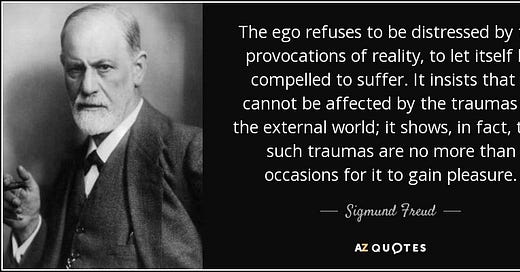Gallows Humor or Thoughts Best Left Unthunk?
It's natural to be inappropriate in our internal monologues.
Admit it, when you found out that the chief executive officer of UnitedHealthCare had been murdered on a Manhattan street, in broad daylight, while heading to an investor conference, you might have thought, however fleetingly, that the man had it coming.
Oh, of course you’re a good person and even within the safety of your mind, you weren’t advocating for his murder. Maybe what you thought is that the killer probably had a reason and even though you absolutely condemn the killing, you somewhat suspect that the motive might understandable, even as the manifested action is inexcusable.
The nice things about the innerspace of our minds is that it’s truly private. I always imagine that psychics like Marvel’s Professor X would be very unhappy. A real life Charles Xavier would be privy to all of the horrible musings that cross the minds of people he loves. He wouldn’t just be overloaded with the mundane but the profane thoughts best not let into the wild. Of course, in 2024, some of us do let these thoughts out into the world and in the comments sections of articles and all over social media, we see that slain CEO Brian Thompson is not a wildly sympathetic victim, at least among the self-selected group of people who post everything they think online.
As I write this, the killer has not even been arrested and we do not know the motive. We think we know the motive because it’s tempting to believe that the insurer, which has a reputation for making it very difficult for patients who pay their premiums to receive their treatments, denied coverage to somebody in need, maybe caused somebody’s needless suffering or avoidable death, and that resulted in the murder of the executive in charge. We don’t know that.
But the thought provides pleasing narrative cohesion and even bends the arc of a chaotic world towards some sort of cosmic justice. This line of thinking dehumanizes Thompson, belittles the loss of his individuality and everything he meant to those who love him, and really reduces him to an abstraction about corporate greed and behavior, and that’s bad because it’s classic objectification and treating people as objects leads to all sorts of calamitous choices like, for example, an early morning murder. At the same time, every day, UnitedHealthCare objectifies its 52 million subscribers as it uses a combination of actuarial work, negotiations with suppliers and automated algorithms so decide who gets healthcare, how much and of what quality.
Back when I was studying playwriting, professor Digby Wolfe, who had written and performed comedy for stage and television all around the world, told me there was no such thing as victimless humor. He was right, of course. A good joke isn’t just words that sound funny together or a juxtaposition of the unusual. A good joke tells a story, has a hero and a villain. When it doesn’t seem so, the person telling the joke is usually the victim of it, like the way Rodney Dangerfield not only gets no respect but tells us how much he doesn’t deserve it. The idea of comedy as social violence is an old one. Woody Allen satirizes it in Stardust Memories and Deconstructing Harry.
Well, it turns out we need this cruelty because it makes us laugh. Laughter is both a physical and emotional response and, at its best, it is as involuntary as a hiccup. Joking that the murdered health insurance CEO died while waiting for pre-approval at the ER isn’t tasteful or dignified, but if it gave somebody struggling with their own insurance nightmare a bit of a chuckle, it was probably worth putting out there.
A lot of the second day coverage of the shooting focused on the online reaction, with a fair bit of “what is wrong with people?” thrown in. Naturally, corporate-owned media that’s supported by advertising paid for by other corporations isn’t going to react to people murdering executives for any cause. The media must demand that the public act in the right way by mourning the loss, condemning the killer and hoping for swift justice.
In The New York Times story about the “torrent of hate for the insurance industry” that followed the killing, we learned that UHC’s leadership, was aware of the poor regard that customers have for their company and that Thompson wanted to change that, though a fundamental business model of maximizing premium collection while minimizing benefit payments presents a formidable obstacle.
Whatever the killer’s motive, the killing inspired revealed anger at the company, its leadership and even Thompson, the man. It might be easy to dismiss it as further coarsening of our culture, particularly online, but I think that’s a mistake. It is anger, but it’s not hatred and it’s not a casual disregard for life, either. It is sarcasm, which is the tool of the weak (and also the tool of every week) and it is appropriate, given our circumstances as citizens, consumers and even people.
It’s a mistake for mainstream media and politicians to lecture people about what’s appropriate here. Such exhortations may even cement people’s feelings on the matter, since this is the same press that became immediately concerned with the humanity of a murdered executive but that ignores the health struggles of every day people, well, every day.
As for the public — keep on joking. Maybe somebody will even listen.


